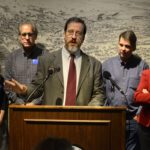Professors’ work helps people with disabilities
Keith and Stacie Whinnery, both associate professors in the University of West Florida Teacher Education program, met Breanna when she was just three years old. The little girl had high muscle tone in her legs caused by cerebral palsy. This caused "scissoring" of her legs and significant separation of her hips. The condition significantly limited her mobility and her doctors recommended surgery to release the muscles in her legs. This however would have left Breanna in a wheelchair for the rest of her life.
Keith and Stacie Whinnery, both associate professors in the University of West Florida Teacher Education program, met Breanna when she was just three years old. The little girl had high muscle tone in her legs caused by cerebral palsy. This caused “scissoring” of her legs and significant separation of her hips. The condition significantly limited her mobility and her doctors recommended surgery to release the muscles in her legs. This however would have left Breanna in a wheelchair for the rest of her life.
With the reluctant permission of her doctors, the Whinnerys began to work with Breanna. The husband and wife team work with a non-profit charitable organization, MOVE International, which is dedicated to helping children and adults with severe disabilities to become actively engaged in their own lives. MOVE stands for Mobility Opportunities Via Education and starts by helping individuals develop the basic mobility skills of sitting, standing, walking and transitioning.
The Whinnerys started by working with the family to determine their needs and goals for Breanna. They then determined the physical support needed to allow Breanna to take part in her favorite activities such as walking to feed her dog, finding her dolls which her mother had hidden around the house and standing to play school at her easel. Physical support was provided either by gait training equipment or adults. The motivating activities encouraged Breanna to work hard to bear much of her own weight and take steps. After diligent work, Breanna gained significant muscle balance in her legs. This lessened the separation in her hips, and Breanna is now able to walk independently with a walker. She never required surgery.
“When you see something like that, you realize that there are many people in wheelchairs who may not need to be there,” said Keith Whinnery. “This gives us our purpose in life.”
The Whinnerys began their work with MOVE approximately 10 years ago. The organization, which operates in 28 countries and provides curriculum in 13 languages, has collaborated with UWF in an effort to conduct research, provide training and promote the mission of the organization. Both Keith and Stacie Whinnery use their training in Teacher Education, in combination with additional MOVE training, to travel the world teaching others the principles and practices of the organization and its purpose.
According to Keith Whinnery, MOVE uses a “top down” approach to mobility training, beginning with the questions “what is the goal for this person – what does this person/family need and wish for?” After the goal is set, the necessary support is provided to accomplish it. Sometimes no adaptive mobility equipment is needed other than bodily support, which is gradually taken away as the person develops greater strength and mobility. He said all MOVE programs are conducted with the permission of the individual’s doctors and with physical therapists, with no unreasonable amount of risk taken.
“The body was meant to move,” said Keith Whinnery. “With no movement for years, the body will shut down. The risk of doing nothing is far greater than the risk of participating in a mobility program.”
Future goals for their work include further development of local programs, specifically developing a MOVE Model Site program in Santa Rosa County. They also want to continue their research with adults who have mobility-limiting disabilities, to help them gain meaningful participation in life. The Whinnerys are currently writing a MOVE for Adults Program.
“We’ve seen adults who haven’t walked in years take steps,” said Stacie Whinnery. “These activities give them the ability to get out more, make their own choices and ultimately improve their overall health.”
For more information, visit the MOVE International Web site at www.move-international.org/ or contact Stacie Whinnery at (850) 474-3268 or e-mail swhinnery@uwf.edu


